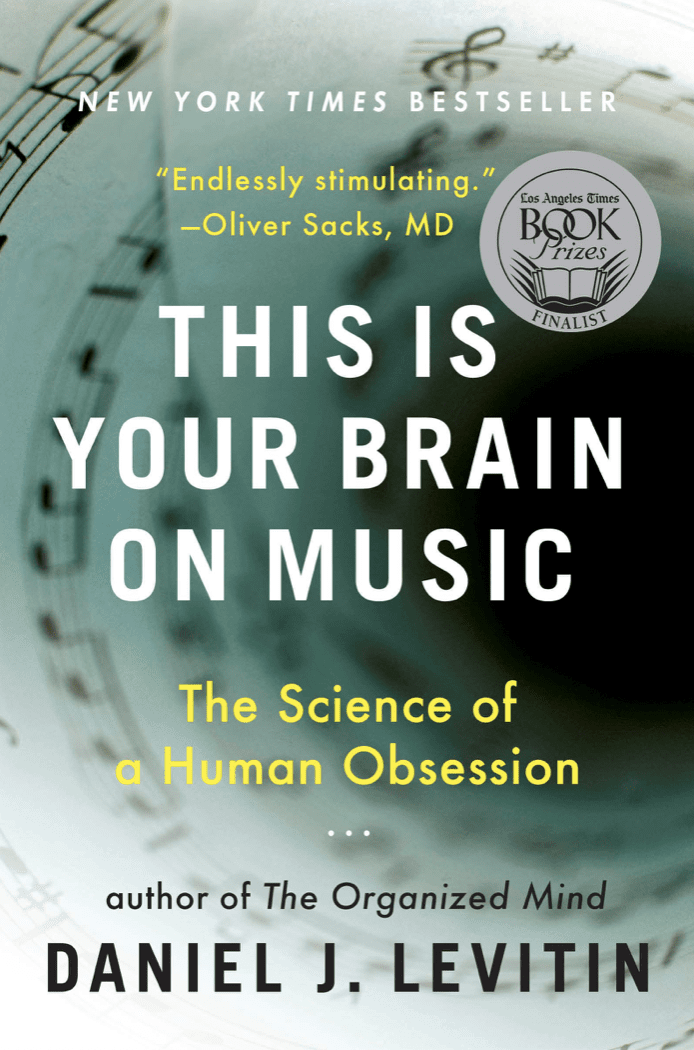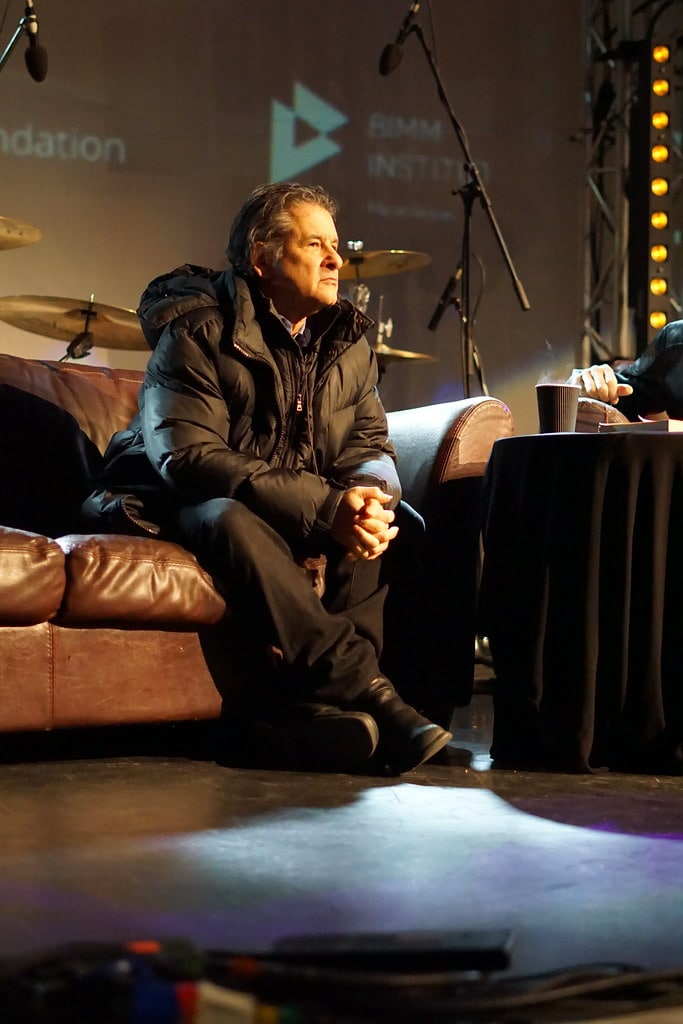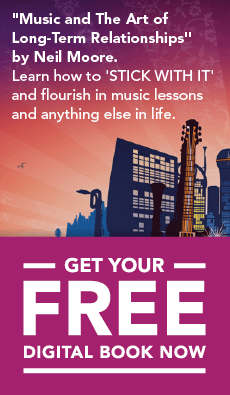This Is Your Brain On Music by Daniel Levitin – Book Review
Found in: Miscellany & Merriment, Reviews
By Rebecca Harding

These questions are worthwhile pondering while reading Levitin’s book. The author presents a fascinating analysis of musical concepts such as pitch, rhythm, timbre, harmony, melody, and key by illuminating the many complex ways our senses and brains turn sound into music, which he describes throughout the book as “organised sound.” Levitin states his book is written for the general reader. As a musician and music educator, I am unable to read his analysis through the eyes of a non-musician so I must assume that these concepts are presented in easily understood terms for all. I believe they are. Levitin uses songs from many eras and genres in his explanations, his diverse choices allowing the reader a higher likelihood of finding a familiar song they can call to mind. His engaging writing style and use of storytelling, descriptive analogies and simple diagrams contribute to a thorough and entertaining breakdown of these concepts.
This in-depth analysis returns us to question the role science plays in art and our understanding of it. Does the very fact that we are performing the analysis at all, contribute to the elevating of music to a realm of complexity and exclusivity? When we apply scientific analysis to the melody of Beethoven’s Ode to Joy, as Levitin does in Chapter 4, dissecting and explaining the use of various techniques utilised in the composition, do we place the composer in a class of individuals that has insights and abilities out of reach to the rest of the population or do we demystify the artist and the creative process? In either case, does this scrutiny take the joy out of Ode to Joy and what are the consequences of doing so?
“A world where everyone plays.” This is one of the stated goals of Simply Music and may seem to most, upon first reading it, to be an unattainable dream. It ignores what many individuals and cultures believe to be a fundamental reality; that of all the human beings in the world a select few of us are musical and the rest are not. Levitin challenges this two-tiered assumption through his presentation of scientific research that shows that for all humans, “music listening, performance, and composition engage nearly every area of the brain that we have so far identified”. Whether or not one can describe music theory or has ever played an instrument, the human brain, it would seem, cannot escape the effect music has, biologically, cognitively, and emotionally. Although most of us do not pursue a career in music or ever perform it publicly, according to neuroscience, “even just a small exposure to music lessons as a child creates neural circuits for music processing that are enhanced and more efficient than for those who lack training.”

Levitin provides evidence that the dream of working towards a world in which everyone plays, turns out to be not a futuristic ideal but rather, a return to what generations of humans experienced until relatively recently. All over the world, it was natural for all humans to consider themselves a part of the collective musicality of their culture. Today, there are a very small number of adults performing and creating music, even though music lessons in childhood are so ubiquitous. This is not true on a global scale. The author tells a story about a colleague visiting Lesotho, a small nation in Africa, where he was invited to sing. His response (“I don’t sing”) was met with confusion. For the members of this village, singing was “an ordinary, everyday activity performed by everyone, young and old, men and women, not an activity reserved for a special few.” The chasm between those who perform and those who regard themselves as not worthy of doing so, appears to be both specific to Western society and “uniquely so with music. Even though most of us can’t play basketball like Shaquille O’Neal, or cook like Julia Child, we can still enjoy playing a friendly backyard game of hoops or cooking a holiday meal for our friends and family.”
If it is true that music is deeply woven into our neurons as well as through the fabric of our many and varied cultures, how do we explain this discrepancy? Teaching methods certainly play a role and as educators, we must challenge the established methods that have contributed to this divide. The playing-based approach of Simply Music shifts the focus of music education away from the reading-based methods that have dominated the past few centuries, particularly in the area of classical music. We call these ‘traditional methods’ but they don’t seem to be traditional at all and have instead moved us away from the natural, observational style of learning that assumed all members of a group participated and that we engaged in from the earliest evidence of music in human societies. The importance of returning to this collective mindset of intrinsic musicality is clear when we start to examine the technological changes in the world and the challenges we will face with the rapidly shifting ideas of what it means to be human.
This is Your Brain on Music was written in 2006. The world has changed, technologically and socially, in drastic ways since then and we can anticipate the continuation of this rapid change as technology impacts humans in increasingly significant and fundamental ways, presenting challenges we can’t fully understand yet. Technology has changed the way we interact with music, in so many ways for the better. We are more globally connected than ever, providing individuals the ability to access information and technology that open doors to learning, recording, and composing without needing formal music lessons or a degree in audio engineering or music composition. Music streaming services and sites like YouTube allow listeners the opportunity to access music from across the globe and for artists to reach those listeners. Recording engineers and composers can manipulate sounds like never before, changing the way we listen to music. As Levitin states, “recording engineers and musicians have learned to create special effects that tickle our brains by exploiting neural circuits that evolved to discern important features of our auditory environment. These special effects are similar in principle to 3D art, motion pictures, or visual illusions, none of which have been around long enough for our brains to have evolved special mechanisms to perceive them”.
As Artificial Intelligence (AI) becomes more prevalent in our lives than ever before, there seems a deepening need to maintain a connection to those things that are fundamental to us as humans. It is extremely unlikely that we will stop the progress of this technology, so it is vital to start asking questions about what we want to achieve in this new era. What will the world look like when many professions become obsolete due to AI? Perhaps it will provide us with more time to explore our creativity. What will the world look like when creative outputs – music compositions, visual art, creative writing, just to name a few – can be done entirely by AI and be indistinguishable from art created by humans? Will we all just stop exploring our creativity because a computer can spit out creations rivalling a Rembrandt, a Charles Dicken’s novel, or a Beatles tune? What impact will that have on our human experience? My hope would be that in maintaining the connection to all that makes us human and all that binds us as social beings, that we can harness the power of our individual and collective creativity to forge new paths ahead and construct new ways of living. I believe music can be a powerful tool in this movement.
Daniel Levitin’s This is Your Brain on Music is an important contribution to the conversation around the impact of music to humanity, both now and in the future. I believe the type of scientific inquiry in Levitin’s book is vital as we ask and answer questions about what it means to be human, biologically, cognitively, and socially and that doing so will equip us with the best chance of creating positive outcomes for the future.
About the Author:

She is a licensed teacher of Simply Music, an innovative, playing-based piano teaching method that has students playing songs from many genres, with both hands, from their very first lessons.
She has been teaching piano for over 10 years and has her Gr. 9 RCM Piano equivalent with the Australian Music Examination Board.
She is a mom of two and still loves to play and grow as a musician. She is a multi-instrumentalist and vocalist and has performed live around the Hamilton/Burlington area in recent years. Her warm, supportive and encouraging nature appeals to students of all ages.








